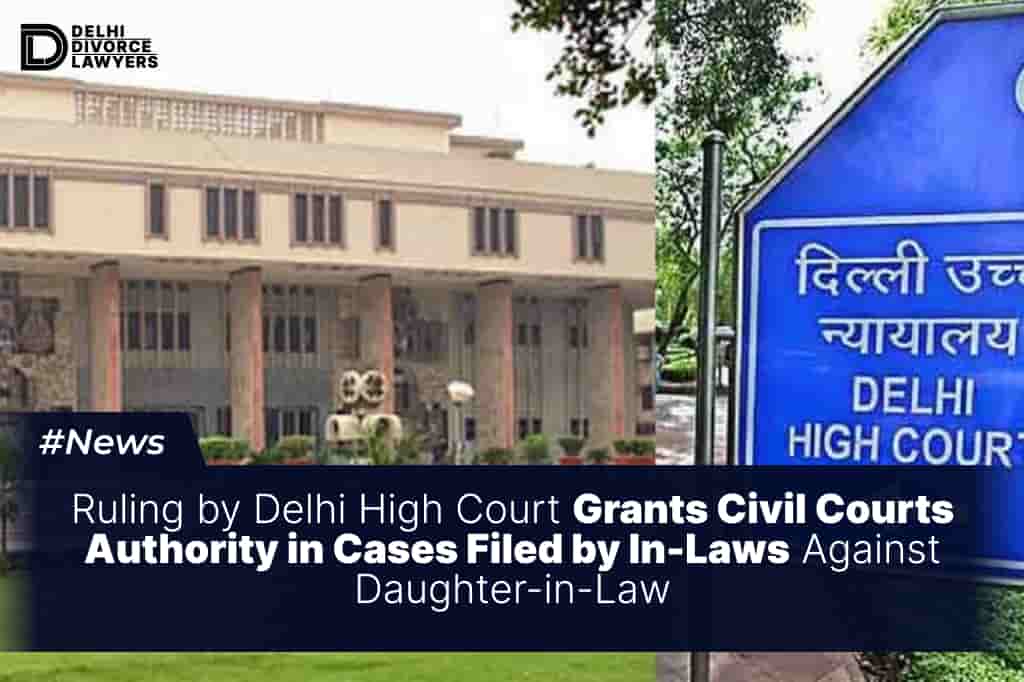The Court emphasised that a matter would fall under the purview of family court only when the circumstances have a direct bearing on the marriage.
The recent ruling from the Delhi High Court underscores that family courts don’t have exclusive jurisdiction over civil suits initiated by in-laws against their daughter-in-law, especially when the relief sought pertains to matters like possession or injunction. In a clarification issued by the division bench, comprising Justice Yashwant Varma and Justice Dharmesh Sharma, it was reiterated that such disputes are to be addressed by civil courts. The court stressed that only those matters directly affecting the marital relationship would be referred to family courts. Furthermore, the Court emphasized that property ownership or possession rights aren’t inherently linked to the maintenance of marital ties.Top of Form
“Indeed, when it comes to a dispute as between mother-in-law and/or father-in-law on the one side and their estranged daughter-in-law on the other side, the claim of proprietorship or ownership of a property and thereby seeking relief in the nature of possession and/or injunction by its very nature incidentally indicates a matrimonial relationship, but such relationship is not a foundational fact so as to lay a claim. Such relationship is not at the core of the dispute but exists independently in civil law, and thus, the Family Courts do not exercise exclusive jurisdiction over such disputes and as an inevitable corollary the jurisdiction of Civil Courts is not barred,” the Court held.
The Court delivered its ruling in response to inquiries raised by a single judge who observed conflicting perspectives among concurrent benches regarding the jurisdiction of family courts compared to civil courts in these matters. The division bench primarily addressed the issue of whether claims brought by third parties such as fathers-in-law or mothers-in-law against either spouse should exclusively fall under the jurisdiction of family courts, thereby excluding civil court jurisdiction. In the case of Avneet Kaur v Sadhu Singh, a single judge had ruled that suits seeking the eviction of a daughter-in-law by her in-laws should be decided by a family court, citing the central role of marriage in such disputes. However, previous rulings by other judges had held that such suits were beyond the scope of family court jurisdiction. After considering arguments presented by counsels, as well as the opinions of the amicus curiae Dr. Amit George and relevant legal precedents, the Court concluded that the interpretation of ‘marital relationship’ must go beyond the traditional understanding of ‘family’.
“The expression, ‘marital relationship’ when bifurcated brings out that the word ‘marital’ has been defined as ‘of or relating to marriage or relations between husband and wife’ while ‘marriage’ has been defined as a ‘formal union of a man and a woman, typically as recognised by law, by which they become husband and wife’,” it explained.
Furthermore, the Court stressed that every lawsuit or legal proceeding governed by the Family Courts Act must clearly delineate the ’cause of action’ for its initiation, and this cause must align with matters falling within the purview of family courts’ jurisdiction.
“The cause of action, in order to bring the case under the subject provision and so as to confer jurisdiction upon the family court must encapsulate a tangible averment that the dispute is one which has an intrinsic nexus with the martial relationship,” it said.
The Court emphasized the significance of ensuring that the circumstances unequivocally establish a direct correlation with elements vital to the marital union. It clarified that merely possessing a marital relationship between the parties, even if it’s tangential, cannot be the sole criterion for channeling proceedings to a family court. Consequently, the Court departed from the interpretation presented in the Avneet Kaur case, which restricted jurisdiction solely to family courts for such disputes.
“It is likely to open a pandora‟s box, which would risk inclusion of all disputes as between the parents and their married children and even siblings within its ambit,” the division bench said.
The Court agreed with the amicus’ argument “that prioritizing the cause of action in deciding the suitable jurisdictional forum also ensures that family courts can maintain their specialized focus on matrimonial matters, averting a situation where they are inundated with cases unrelated to marital relationships.” In essence, the Court asserted that the decision of whether a claim linked to a marital relationship should be heard before the family court or the civil court should be examined and resolved by identifying the fundamental basis of the claim.
“An assertion of a particular suit or proceeding being liable to be tried exclusively by the Family Court would succeed only if it is established that there is a direct nexus between the ‘cause of action’ and the ‘marital relationship’.”
Consequently, the Court overturned the Avneet Kaur ruling and embraced alternative perspectives articulated in other judgments. Additionally, the Court clarified that whether the husband is included or excluded as a party in the lawsuit brought by his parents does not singularly determine the jurisdiction of the family court.
“The joinder or non-joinder of parties would have to be considered in light of the plethora of case law which already exists on that issue. Ultimately and irrespective of whether a husband is joined or not, the jurisdiction of the Family Court would have to [be] ascertained based on the cause of action and whether that is founded on the marital relationship or has a mere casual or incidental connection to the cause,” it said.

